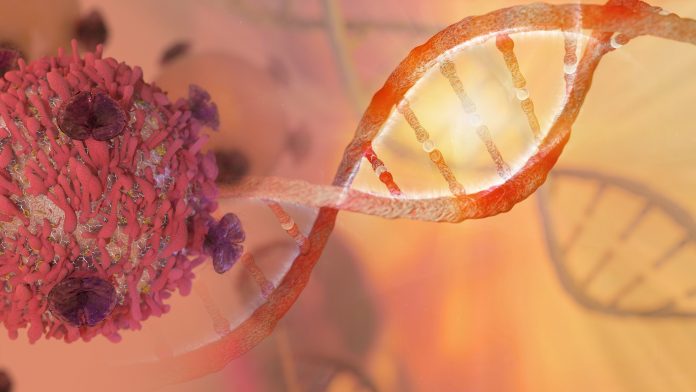
The strongest evidence to date has been provided that links BRCA mutations to prostate and pancreatic cancer risk. The study was published this week in the Journal of Clinical Oncology.
This team analyzed data from almost 3,200 families with one or more members with the BRCA1 mutation and almost 2,200 families carrying the BRCA2 mutation. The families had all been recruited to the Consortium of Investigators of Modifiers of BRCA1/2 (CIMBA). The researchers examined the associations with 22 primary cancers.
From the data, these researchers estimated that men who carry a BRCA2 mutation have a 27% risk of developing prostate cancer by the time they are 80 years old, more than double the rate compared to non-carriers. Notably, BRCA1 mutations were not associated with an increase in prostate cancer risk.
Carrying a defective copy of either BRCA1 or BRCA2 more than doubled an individual’s risk of pancreatic cancer to 2.5–3% by age 80. The mutations were also found to increase the risk of stomach cancer, though the researchers caution that because of the rarity of this form of cancer, the number of patients in their datasets was small.
Mutations in both genes significantly increased the risk of breast cancer in men, though the disease is still very rare, accounting for less than 1% of all male cancer cases in the U.K. While a BRCA1 mutation increased a man’s risk of developing breast cancer more than four-fold to 0.4% by age 80, a BRCA2 mutation increased this risk by 44 times to 3.8% by age 80. It is estimated that 38 out of 1,000 male carriers of the BRCA2 mutation will develop breast cancer by age 80.
Antonis Antoniou from the Department of Public Health and Primary Care at the University of Cambridge, who led the research, said, “These large datasets of patients have allowed us to estimate with much greater accuracy the extent to which faulty BRCA1 and BRCA2 genes increase the risk of several cancers. We’ve known for some time that they’re linked to breast and ovarian cancer, but there’s been uncertainty about other cancers.”
Marc Tischkowitz from the Department of Medical Genetics at the University of Cambridge added: “The link between BRCA2 and prostate cancer and pancreatic cancer is now much clearer, thanks to the data we’ve analyzed. We have also identified a potential link with stomach cancer, but this is based on small numbers and needs further study. Our data suggests that there is no strong link between BRCA2 and melanoma, which may provide greater clarity to BRCA2 gene carriers.”
He added that, “Overall, the results will add to our knowledge on optimizing cancer screening and early detection strategies for people who are known to carry these faulty genes.”
Michelle Mitchell, chief executive of Cancer Research UK, said, “Our scientists helped to discover BRCA over 25 years ago and established that faults in these genes increase breast cancer risk. This study has built on that vital knowledge, giving us some important new insights into BRCA genes and the likely risks of developing prostate and pancreatic cancer.
“Cancers caused by inherited faulty BRCA genes are relatively rare, and other factors like age, smoking, diet and other preventable factors contribute to a person’s risk.
“Improving our understanding of how faults in our genes are associated with certain cancers puts us in a much better position to pinpoint those at a higher risk of developing cancer.”













